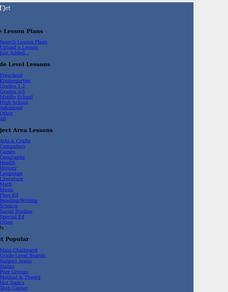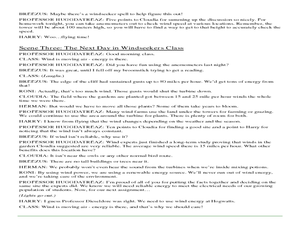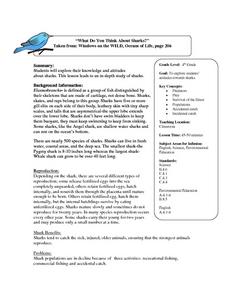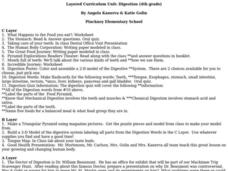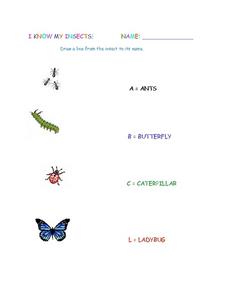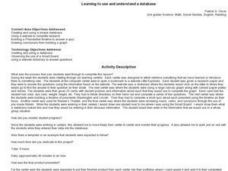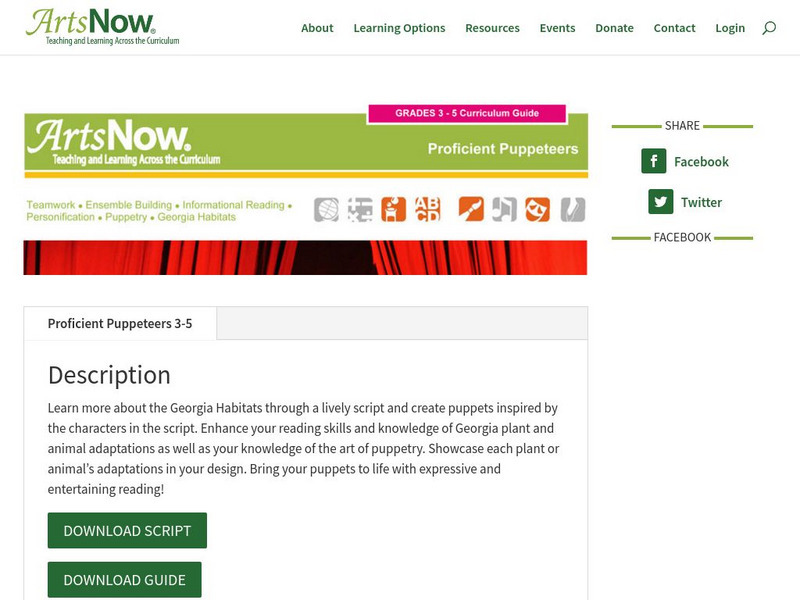NWT Literacy Council
Readers Theatre Scripts
Engage and entertain young learners with this collection of readers theatre activities. With over 25 different scripts, a wide range of topics are covered from simple counting and rhyming exercises to adaptions of popular children's...
Science Matters
Matter Cycles — Sum It Up
Scholars become part of the cycle of matter with a reader's theater that showcases producers, consumers, decomposers, and the sun. A diagram and discussion concludes the learning experience and enhances comprehension.
Smarter Balanced
Effects of Water
To prepare for a performance task assessment, class members review the stages of the water cycle and then individuals assume the roles of drops of water for a Reader's Theater exercise. The script, a graphic depicting the water...
Curated OER
Around the Water Cycle--A Reader's Theater
Pupils read aloud a play script in a group to research the water cycle. They take the parts of raindrops. The amount of raindrops can be adjusted to fit group size.
Curated OER
Energy Play: Harry Spotter and the Chamber of Windy Myths
Students explore the concept of renewable energy. In this alternative energy instructional activity, students participate in a play that conveys information regarding wind energy. The script may be performed as a play with props or as a...
Curated OER
Water Cycle Voice Thread
Students understand the water cycle through a role playing activity. In this water cycle lesson, students become familiar with the water cycle through a play about the water cycle. Students illustrate their parts and create a VoiceThread...
Curated OER
Pigs: Facts And Fun
Students complete a unit on pigs. They take a field trip to the fair and zoo, watch the video of "Charlotte's Web," create a poster, read and analyze "The Three Little Pigs," write a storybook, participate in a reader's theater, and make...
Curated OER
What Do You Think About Sharks?
Fourth graders explore sharks. They read a story about sharks and act out using Reader's Theater. They discuss fact and attitude statements about sharks and complete a Shark Survey. They create a shark promotion brochure informing...
Curated OER
Digestion
Fourth graders answer the question what happens to the food you eat? They complete a worksheet about the food you eat. They discuss the different types of teeth that we have. Students complete digestion poster in which they color and...
Curated OER
I love penguins!
Students listen to stories and view video about penguins. In this penguins lesson, students research penguins in groups and present a report using their choice of technology or artwork presentation.
Curated OER
I Know My Insects!
In this insect matching worksheet, students identify the insect pictures and then draw a line from the insect to its name. Students match 4 insects.
Curated OER
Catching Some Rays
Sixth graders explore the tilt of Earth's axis. In this Earth lesson, 6th graders read a Greek mythology story explaining why there are seasons. Students build a sun-ray gathering tool from styrofoam, glue, thermometers, skewers, and...
Curated OER
A Parade Of Penguins
Second graders complete a variety of penguin-related activities. They discuss and compare different types of penguins, complete worksheets and Venn diagrams, make craft penguins and dioramas.
Curated OER
On Thinning Ice: An eco-theatre production about climate change
Young scholars investigate the causes and possible consequences of climate change in the north, and realize their choices and actions can help reduce climate change. Some of the skills involved in the instructional activity are...
Curated OER
Learning to use and understand a database
Second graders were given a research paper and they were to answer the questions using the information found on the website. The website was a dictionary where the students would click on the letter to where they would go to find the...
ArtsNow
Arts Now Learning: Proficient Puppeteers
For this lesson, students create puppets for the characters in a Reader's Theater script called 'Georgia State Animals & Plants: Habitats and Adaptations.' The puppets showcase the adaptations for each plant or animal. Students then...



